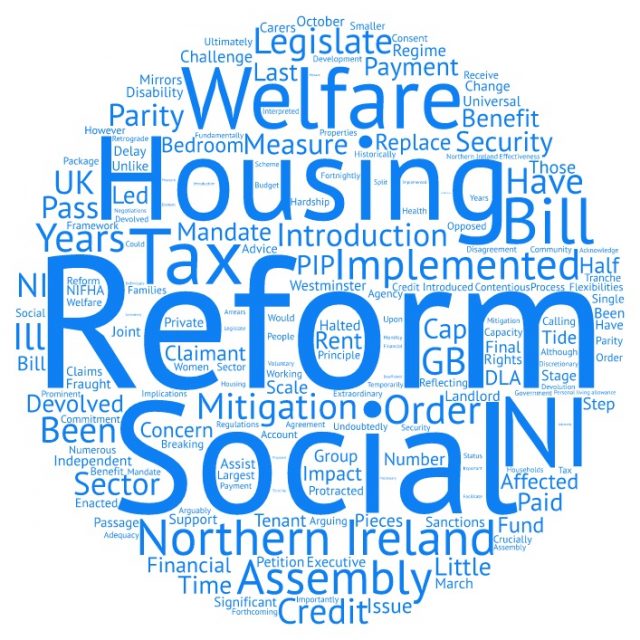The Welfare Reform Bill was undoubtedly one of the most contentious pieces of legislation to come before the Assembly in the last mandate. Where have we got to and what challenges lie ahead?

The passage of the Bill was protracted and fraught with disagreement, reflecting the scale of concern over its impact on Northern Ireland. The Bill was first introduced in October 2012; some two and a half years later, in March 2015, a Petition of Concern ultimately halted the Bill passing its Final Stage. This was an extraordinary development. Even though social security is a devolved matter, the ‘parity principle’ and the financial implications of breaking parity has historically provided the Assembly with little option but to pass social security legislation that largely mirrors that in Great Britain. Following the Fresh Start Agreement, the welfare reform framework was enacted in Westminster rather than the Assembly via the Welfare Reform (Northern Ireland) Order 2015.
There is now little capacity to hold back the tide, at least in terms of the legislative introduction of the reforms, many of which have already been implemented in GB for some time. Although numerous other reforms have been implemented here over a number of years, the 2015 Order represents the largest and most significant tranche of reform:
- Universal Credit will replace six benefits and tax credits;
- Personal Independence Payment (PIP) will replace Disability Living Allowance (DLA);
- There will be a new ‘Claimant Commitment’ along with a new conditionality and sanctions regime; and
- A Benefit Cap.
Crucially, one of the mitigation measures agreed by the Northern Ireland Executive is that, at least over the next four years, it will provide funding so that the ‘bedroom tax’ will not apply here. The Chartered Institute of Housing (NI), the Northern Ireland Federation of Housing Associations (NIFHA) and Housing Rights have consistently opposed the introduction of the bedroom tax, arguing that it would create considerable hardship for social housing tenants. Fundamentally there is an insufficient number of smaller properties in the social housing sector in NI to facilitate the introduction of this measure.
The implementation of the 2015 Order and forthcoming Regulations will be one of the most significant challenges for the Assembly in the new mandate. It will impact upon social housing providers and their associated representative groups, private rented sector landlords, the community and voluntary sector, the Social Security Agency and most importantly, individuals and families. However, it is important to acknowledge that in many respects much has been gained from the delay in implementing the reforms and the associated negotiations with the UK Government. For example:
- Mitigation: a package of mitigation measures was proposed by the Welfare Reform Mitigations Working Group led by Professor Eileen Evason and agreed by the Northern Ireland Executive e.g. supplementary payments for those who will be adversely affected by the reforms such as carers, claimants with disabilities and ill health, households affected by the Benefit Cap and changes to tax credits, those affected by the new sanctions regime; a Discretionary Support Scheme to replace the Social Fund; and financial support for the independent advice sector in order to assist people through the change process.
- ‘Flexibilities’: including the housing element of Universal Credit (UC) to be paid to the landlord rather than the tenant; claimants to receive fortnightly rather than monthly payments of UC; and payment of UC for joint claims can be split rather than paid into a single back account. These flexibilities will hopefully avoid rent arrears and provide women, in particular, with financial independence.
Two issues in particular may be prominent in the new mandate. The first is the status of ‘parity’. The Assembly consent for Westminster (albeit temporarily) to legislate for welfare reform, a devolved matter, could be interpreted as an arguably necessary, but retrograde, step. This is particularly at a time when other UK devolved legislatures are calling for greater devolution on social security matters. The second issue relates to the scrutiny of the effectiveness of the mitigation measures and the adequacy of its associated budget.

